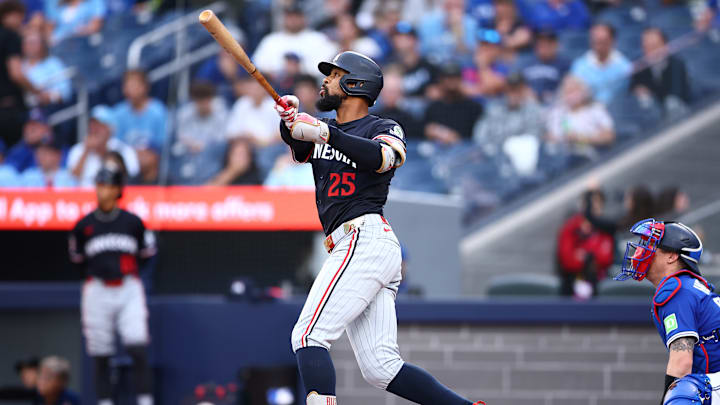The MLB Most Valuable Player award, by definition, is given to the player in each league who contributed the most to their team. While the meaning of "valuable" is left to the voters from the Baseball Writers Association of America (BBWAA), it cannot be denied that in recent years, the MVP chatter has revolved mainly around players with monster offensive numbers. This year is no different, as the current MVP race features many of the same faces as before, with Aaron Judge and Shohei Ohtani leading their respective leagues. Cal Raleigh bounces between 1 and 2 in the race for the AL, depending on the day.
So, in the age of sluggers dominating the MVP narrative, it is time to look at who the award was supposed to honor - the most valuable player, not the most valuable hitter. While the best players in the league often bring both elite offense and defense to the table, nowhere is there a more precise distinction than with the Minnesota Twins' Byron Buxton.
Buxton's 2025 Season
In 2025, Buxton has been more than just the Twins' hottest bat. Yes, his recently achieved career-high of 29 home runs and steady run productions certainly stand out, but Buxton's value goes beyond the box score. His defense in center field saves runs that will never show up in a traditional stat recap. His speed on the basepaths changes how pitchers approach batters, and his leadership - especially in a year where the Twins traded away core stars - has kept the clubhouse from unraveling.
In short, Buxton has been an anchor. He is the player teammates look to when games get tight, and the one who keeps fans engaged in a season many have written off. When he's in the lineup, the impact is felt just as much as when he has a day off. He makes a difference to his team - precisely what an MVP should do. Mind you, I'm not arguing that Buxton is the league MVP but rather a model for what it used to mean.
The Misunderstanding of MVP
When fans and media equate "MVP" with "best hitter," they're ignoring the fundamental purpose of the award. Value is not about sheer numbers - it's about impact. A first baseman who mashes 40 home runs but provides negative defensive value and limited leadership may rack up votes from the BBWAA, but does that make him the most valuable player?
Buxton reminds us that a true MVP is the player without whom the team would be completely different. He isn't just padding stats; he's altering games in ways that don't always appear on the scoreboard.
Redefining "Value"
Buxton's 2025 season is not just about individual excellence - it is a case study in redefining what MVP means. If the award is to truly reflect value, then voters, fans, and analysts need to look beyond the home run column. Value is leadership. Value is defense. Value is resilience. Are offensive stats important? Yes, of course they are, but we need to reframe how we look at the value of a ballplayer, whether it be for MVP or Hall of Fame consideration. Stay tuned for a piece on Torii Hunter later this fall.
I'll admit: I have not always been Byron Buxton's most ardent fan. Over the years, the flashes of brilliance were often overshadowed by the long stretches of injury and inconsistency at the plate. It was easy to wonder if the 5-tool promise we were sold would ever outweigh the frustration.
But this year has been different. Watching Buxton stay on the field, leading by example and carrying a team stripped of many of its key players, has reshaped my view of him. I respect him not only as a player and the fantastic season he has put together, but as a clubhouse leader. He has caused me to pause and reconsider what a truly valuable player is not only to a team but to the league.
